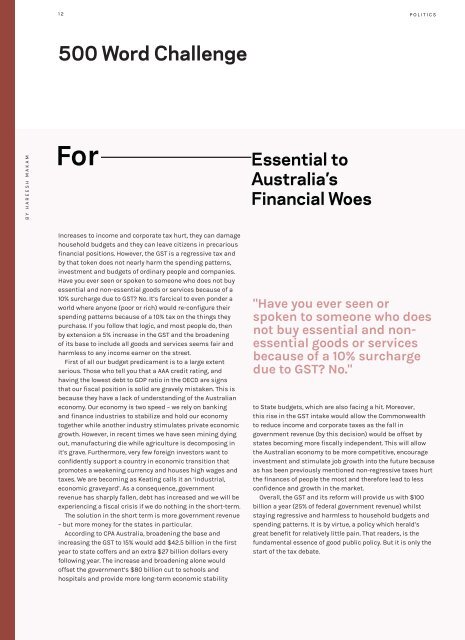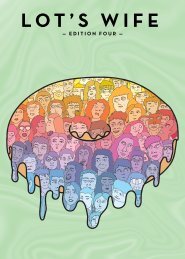Lot's Wife Edition 6 2015
Create successful ePaper yourself
Turn your PDF publications into a flip-book with our unique Google optimized e-Paper software.
12<br />
POLITICS<br />
500 Word Challenge<br />
BY HAREESH MAKAM<br />
For<br />
Essential to<br />
Australia’s<br />
Financial Woes<br />
Increases to income and corporate tax hurt, they can damage<br />
household budgets and they can leave citizens in precarious<br />
financial positions. However, the GST is a regressive tax and<br />
by that token does not nearly harm the spending patterns,<br />
investment and budgets of ordinary people and companies.<br />
Have you ever seen or spoken to someone who does not buy<br />
essential and non-essential goods or services because of a<br />
10% surcharge due to GST? No. It’s farcical to even ponder a<br />
world where anyone (poor or rich) would re-configure their<br />
spending patterns because of a 10% tax on the things they<br />
purchase. If you follow that logic, and most people do, then<br />
by extension a 5% increase in the GST and the broadening<br />
of its base to include all goods and services seems fair and<br />
harmless to any income earner on the street.<br />
First of all our budget predicament is to a large extent<br />
serious. Those who tell you that a AAA credit rating, and<br />
having the lowest debt to GDP ratio in the OECD are signs<br />
that our fiscal position is solid are gravely mistaken. This is<br />
because they have a lack of understanding of the Australian<br />
economy. Our economy is two speed – we rely on banking<br />
and finance industries to stabilize and hold our economy<br />
together while another industry stimulates private economic<br />
growth. However, in recent times we have seen mining dying<br />
out, manufacturing die while agriculture is decomposing in<br />
it’s grave. Furthermore, very few foreign investors want to<br />
confidently support a country in economic transition that<br />
promotes a weakening currency and houses high wages and<br />
taxes. We are becoming as Keating calls it an ‘industrial,<br />
economic graveyard’. As a consequence, government<br />
revenue has sharply fallen, debt has increased and we will be<br />
experiencing a fiscal crisis if we do nothing in the short-term.<br />
The solution in the short term is more government revenue<br />
– but more money for the states in particular.<br />
According to CPA Australia, broadening the base and<br />
increasing the GST to 15% would add $42.5 billion in the first<br />
year to state coffers and an extra $27 billion dollars every<br />
following year. The increase and broadening alone would<br />
offset the government’s $80 billion cut to schools and<br />
hospitals and provide more long-term economic stability<br />
"Have you ever seen or<br />
spoken to someone who does<br />
not buy essential and nonessential<br />
goods or services<br />
because of a 10% surcharge<br />
due to GST? No."<br />
to State budgets, which are also facing a hit. Moreover,<br />
this rise in the GST intake would allow the Commonwealth<br />
to reduce income and corporate taxes as the fall in<br />
government revenue (by this decision) would be offset by<br />
states becoming more fiscally independent. This will allow<br />
the Australian economy to be more competitive, encourage<br />
investment and stimulate job growth into the future because<br />
as has been previously mentioned non-regressive taxes hurt<br />
the finances of people the most and therefore lead to less<br />
confidence and growth in the market.<br />
Overall, the GST and its reform will provide us with $100<br />
billion a year (25% of federal government revenue) whilst<br />
staying regressive and harmless to household budgets and<br />
spending patterns. It is by virtue, a policy which herald’s<br />
great benefit for relatively little pain. That readers, is the<br />
fundamental essence of good public policy. But it is only the<br />
start of the tax debate.

















